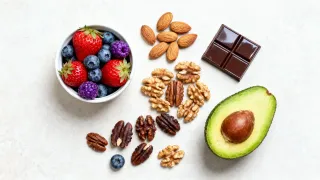1. Eat Better
Aim for an overall healthy eating pattern that includes whole foods, lots of fruits and vegetables, lean protein, nuts, seeds, and cooking in non-tropical oils such as olive and canola.
2. Be More Active
Adults should get 2 ½ hours of moderate or 75 minutes of vigorous physicalractivity per week. Kids should have 60 minutes every day, including play andrstructured activities.
3. Quit Tobacco
Use of inhaled nicotine delivery products, which includes traditional cigarettes, e-cigarettes and vaping, is the leading cause of preventable death in the U.S., including about a third of all deaths from heart disease. Roughly 40% of U.S. children ages 3-11 are exposed to secondhand smoke.
4. Get Healthy Sleep
Most adults need 7-9 hours of sleep each night. Children require more: 10-16rhours for ages 5 and younger, including naps; 9-12 hours for ages 6-12; and 8-10rhours for ages 13-18. Adequate sleep promotes healing, improves brain function and reduces the risk for chronic diseases.
5. Manage Weight
Achieving and maintaining a healthy weight has many benefits. Body mass index, a numerical value of your weight in relation to your height, is a useful gauge.rOptimal BMI is less than 25, but less than 18.5 is considered underweight. You can calculate it online or consult a health care professional.
6. Control Cholesterol
High levels of non-HDL, or “bad,” cholesterol can lead to heart disease. Your health care professional can consider non-HDL cholesterol as the preferred number to monitor, rather than total cholesterol, because it can be measured without fasting beforehand and is reliably calculated among all people.
7. Manage Blood Sugar
Most of the food we eat is turned into glucose (or blood sugar) that our bodiesruse as energy. Over time, high levels of blood sugar can damage your heart,rkidneys, eyes and nerves. As part of testing, monitoring hemoglobin A1c canrbetter reflect long-term control in people with diabetes or prediabetes.
8. Manage Blood Pressure
Keeping your blood pressure within acceptable ranges can keep you healthierrlonger. Levels less than 120/80 mm Hg are optimal.





